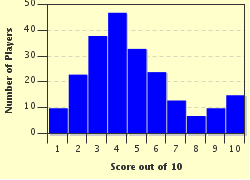Quiz Answer Key and Fun Facts
1. Cilla Black and Dionne Warwick released successful versions of "Alfie" in the sixties. Which artist released a version in 1966 that made the US Top Forty?
2. Which member of The Beatles used the name Bernard Webb when he composed Peter and Gordon's US Number 14 single "Woman"?
3. What was the title of Fontella Bass' 1966 follow-up to her 1965 Top Ten single "Rescue Me"?
4. Which of Elvis Presley's movie soundtrack singles did he take to Number 40 in 1966?
5. Which Rolling Stone song did Otis Redding perform at the Monterey International Pop Music Festival and take to Number 31 in 1966?
6. Which single from the Herb Alpert and the Tijuana Brass album "S.R.O." reached Number 19 on the 1966 US charts?
7. "Cherish" by The Association was their first US Number One single.
8. Which group reached Number Two in 1966 with "Daydream"?
9. Which song was a US Top Ten by Paul Revere and the Raiders in 1966?
10. Which artist had a Number Ten hit with his Jazz-influenced rendition of "Summertime" in 1966?
Source: Author
shanteyman
This quiz was reviewed by FunTrivia editor
agony before going online.
Any errors found in FunTrivia content are routinely corrected through our feedback system.


